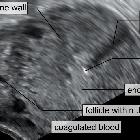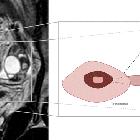angular ectopic pregnancy



Interstitial ectopic pregnancy, also known as intramural ectopic pregnancy, is an important type of ectopic pregnancy with higher risks of rupture and hemorrhage compared to usual tubal ectopic pregnancies.
Terminology
The term interstitial pregnancy is sometimes interchangeably used with cornual pregnancy, but the latter specifically refers to the presence of a gestational sac within a rudimentary uterine horn, a unicornuate uterus, cornua of a bicornuate uterus or septate uterus.
Epidemiology
It accounts for 2-4% of all ectopics and is the most common site for an atypical ectopic pregnancy. The incidence is thought to be rising .
Pathology
It occurs within the interstitial portion of the fallopian tube and therefore has the potential to grow to larger sizes than standard tubal ectopic pregnancies by the time of presentation. Hence the risk and severity of hemorrhage are higher.
The main risk factor is a history of prior intrauterine instrumentation.
Radiographic features
Ultrasound
Sonographic features include:
- interstitial line sign
- an echogenic line from the mass to the endometrial echo complex reportedly has high sensitivity (80%) and specificity (98%)
- may show an eccentric gestational sac
- the diagnosis is suggested by visualization of an intrauterine gestational sac or decidual reaction located high in the fundus, with <5 mm of surrounding myometrium in all planes ("myometrial mantle")
3D ultrasound may be helpful for delineating a gestational sac's location.
MRI
Gestational sac eccentric to the junctional zone.
Treatment and prognosis
The morbidity and mortality are higher (15x) due to a later presentation and associated complications.
Management of an interstitial ectopic includes the use of methotrexate (either systemic or local), potassium chloride (KCl) injection, conservative laparoscopic surgery, uterine artery embolization (UAE), cornuectomy or hysterectomy. The latter two are usually reserved for emergency situations or in case of failure of the other methods.
Complications
- uterine myometrial rupture: tends to occur by the 2 trimester
- greater tendency for massive hemorrhage (as above)
Differential diagnosis
For an eccentric gestational sac on imaging, consider the article on the differential diagnosis of an eccentric gestational sac or angular pregnancy.
Siehe auch:
- Extrauteringravidität
- Uterus septus
- Uterus bicornis
- Eileiter
- interstitial line sign
- eccentric gestational sac
- atypische Extrauteringravidität
- Differential diagnosis of an eccentric gestational sac
- uterine myometrial rupture
und weiter:

 Assoziationen und Differentialdiagnosen zu interstitial ectopic pregnancy:
Assoziationen und Differentialdiagnosen zu interstitial ectopic pregnancy:



